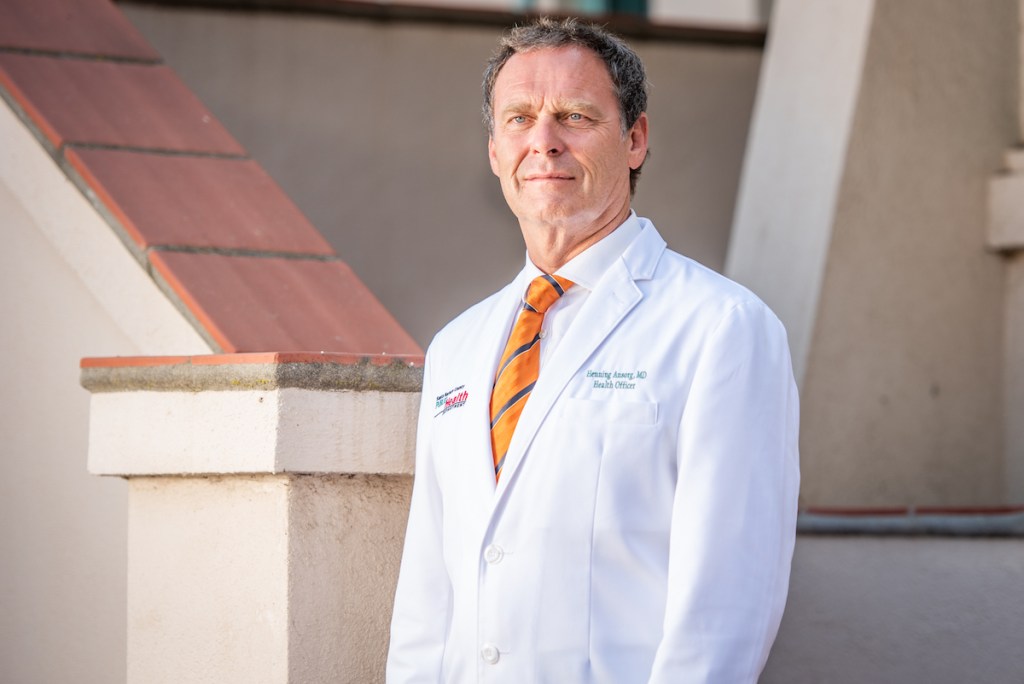If you look at the pandemic in Santa Barbara County today, the case-rate curve has a shape similar to last summer’s, but it’s staying stubbornly higher in all respects. As for those known to have antibodies that add some level of immunity to this new disease, 276,895 people are fully vaccinated, and 44,785 have survived a COVID infection. We asked the county’s health officer, Dr. Henning Ansorg, if we were approaching herd immunity yet and how to best protect ourselves if we weren’t. His answers are here, edited for length.
Have we reached herd immunity?
In no way are we at herd immunity. If we were, we would not see the amount of new infection all the time. Every virus leaves some natural immunity — some for life; some for half a year. That’s why we can get the common cold a couple times a year, and some of those are caused by a coronavirus. They’re not known for leaving a lasting immunity.
The problem is that the virus — SARS-CoV-2 — has not been around long enough. We don’t know which antibodies confer immunity most reliably.
Can you explain what you mean?
The vaccines produce an antibody against the virus spike protein (anti-S), which the virus uses to attach to the cells in the nose or throat. If someone has a serious case of COVID, it will also trigger antibodies against the nucleocapsid protein (anti-N), which is inside the virus, not on the surface like the spike protein.
The tests you can buy give a positive or negative; they don’t tell you if it’s a high or low level. Studies are being done on this, because it’s very important to have a good answer. Is it maybe the ratio between anti-N and anti-S? Is it a combination? We don’t really know yet.
To complicate it even more, the immunity that is even more powerful is cellular antibodies. These are conferred from T cells, and they create a whole cascade of immune responses driven by cell function that clear the virus from the body.
With viruses that we’ve known for a long time, such as Hepatitis B, we know the level of antibody titer [concentration] that means you need a booster shot, though it can vary from person to person. This is not yet the case with COVID. It is a more complex virus.
Studies show that people with cleared infections have a huge variety of antibody responses. Some with mild disease had little antibody response. Age issues make things more complicated. Over the age of 65 — some say 50 — people do not mount such strong immune responses after vaccination because their immune system is weaker.
So if you’re older, get a booster?
Yes, and I recommend to anyone to at least get one shot. The studies show that even people who’ve had COVID, after the shot, they have the most robust response so far.
Mixing the shots doesn’t really matter. All three trigger an immune response to block the virus. It might matter for individuals, however. Some people have side effects to vaccines, and they should discuss with their doctor which is best on the personal level.
Can we assume a strong immune system is good protection?
It’s best not to get the virus in the first place. There are treatments that work, but it’s not just saving your life; it’s saving your lungs. Some now have chronic lung disease; their life has changed.
There is some fear of the vaccine, and it varies depending on where people get their information. When people say they do their own research on Google, I have to say, “That is not research.” It’s hard work to do research; to read and understand research requires a degree and tenacity. I’m sorry, but it’s as if they’ve done research on Google for a colonoscopy. Do you want them to do your colonoscopy?
But there’s a reason people look on the internet. Science is slow; the pandemic is fast, faster than us and faster than research. We are always lagging behind.
As a public health officer, I get scolded, “You don’t have any data for these measures.” At the same time, they turn it against me if I have data — then the data is not valid. So which one is it? Do you trust science, or do you not trust science? I can’t make it right for some people. It’s hard.
What do you expect for the winter?
Last year was like clockwork. Two weeks after Thanksgiving, cases really went up. We are seeing a little different trend: Hospitalizations are not as frequent as last year, because of the vaccination status.
For self-protection, avoid crowds. We still have a lot of transmission going on in the community. Meet your friends outdoors; we have beautiful weather. If you want to travel, wear a really well-fitting mask, like a K95.
We have hope for these antivirals that seem to have done wonderfully, from Merck and Pfizer. There are a lot of caveats with that. If Merck gets emergency-use authorization, they say they can produce 1.7 million courses of treatment. That’s a drop in the bucket, but better than nothing. It’s really a godsend to have drugs that very reliably and effectively work against the effects of COVID.
At the Santa Barbara Independent, our staff continues to cover every aspect of the COVID-19 pandemic. Support the important work we do by making a direct contribution.

